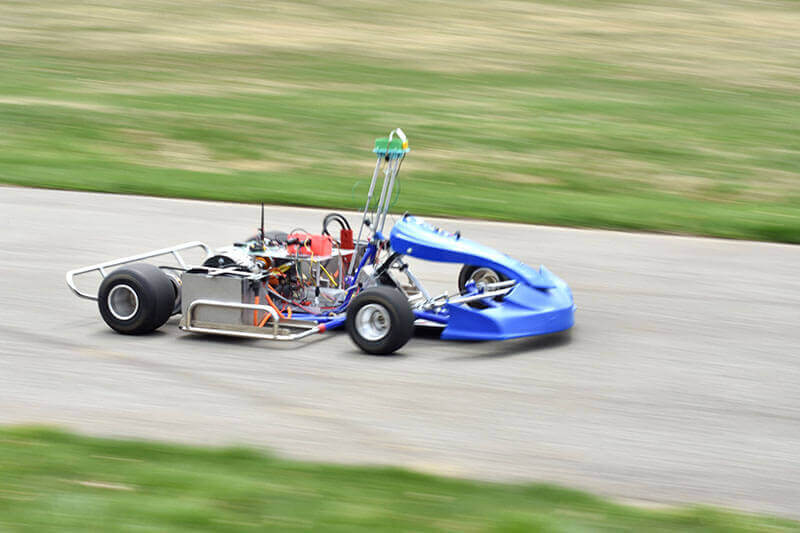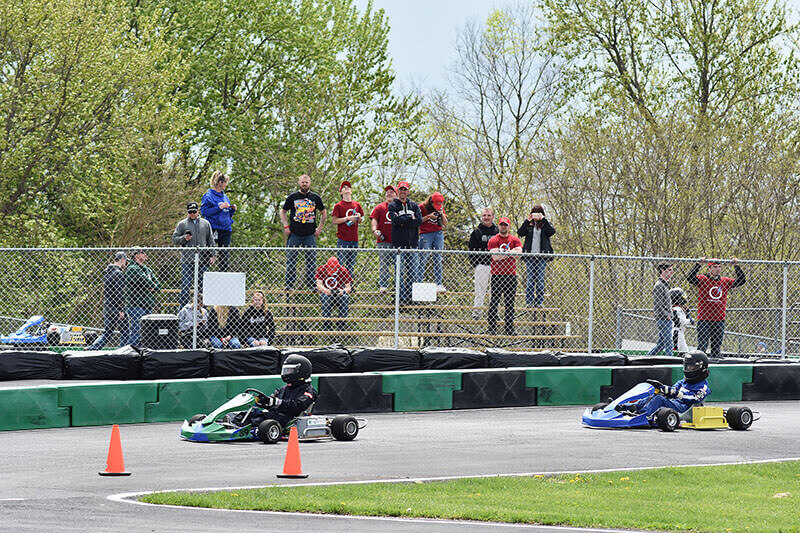May 1, 2019
Autonomous go-karts: Don’t pour a bottle of milk over this race winner

An autonomous kart is on the track for a “Test and Tune” event on April 6 at CERAland track in Columbus, Indiana. Karts from Purdue and Anderson universities attended the test.
WEST LAFAYETTE, Ind. — In less than a month, Helio Castroneves, Tony Kanaan, Scott Dixon and last year’s champ, Will Power, will look to add to their Borg-Warner trophy cases by winning the Indianapolis 500.
But one of the winners at events at the Indianapolis Motor Speedway this May won’t be a person. It will be an autonomous car.
Purdue University Motorsports on May 14-15 will again showcase its evGrand Prix for high school and college divisions. And for the second year, autonomous karts will take to the makeshift track inside the Indianapolis Motor Speedway grounds for the Student Karting World Finals presented by Hoosier Racing Tire.
This is one of many events celebrating Purdue’s Sesquicentennial, 150 Years of Giant Leaps. This yearlong celebration is highlighting Purdue’s remarkable history of giant leaps, while focusing on what giant leaps Purdue can take to address the world’s problems. One of the four themes is “Artificial Intelligence, Algorithms and Automation: Balancing Humanity and Technology.”
 Teams practice at a recent Test and Tune on April 27 at Whiteland Raceway Park.
Download image
Teams practice at a recent Test and Tune on April 27 at Whiteland Raceway Park.
Download image
“We’re excited to have the Autonomous Division again join the evGrand Prix’s existing set of high school and collegiate competitions. This brings a new level of engineering design to the program, requiring more in-depth knowledge of sensors, software and even artificial intelligence,” said E.J. Williams, EV expert and support staff for evGrand Prix.
On May 14, the college-series race will feature 20 lithium-powered karts from colleges across the country, starting at 4 p.m.
Collegiate autonomous karts will practice both days, with the race starting at 2 p.m. on May 15.
In the high school division, racing teams from 24 high schools and technical career training centers will compete in manned karts at 4 p.m. May 15.
Both days will start at 8 a.m. with tech inspection, team meetings, numerous practices and qualifications scheduled throughout the day prior to the races.
The races are included as part of the daily gate admission at Indianapolis Motor Speedway. IndyCar will be having practice sessions on the track on May 14-15.
“These are not just races for the high school and college students,” said Danny White, manager of Purdue Motorsports and K-12 Schools Partnerships. “These projects have a large economic development and STEM (Science, Technology, Engineering and Math) component, especially as the auto and racing industry both have deep ties to Indiana.”
With many countries looking to limit or ban production on internal combustion engines, electric autonomous transportation will be the future, White said.
“This upcoming transition will be the largest disruptive technology shift we have ever seen, larger than when we went to mechanized transportation,” he said. “We need to make sure that we are teaching the students relevant engineering and technology for their future and what will also be relevant and continue to produce the types and caliber of students that will attract manufacturers to relocate to Indiana or find our students a new refreshing and up-to-speed resource they are so desperately seeking.”
Purdue’s M-STEM3 – or Motorsports STEM for Manufacturing and Medicine – is working with high school and collegiate racing teams and industry representatives to expand racing as well as improve safety and speed.
For the series, Purdue Motorsports and evGrand Prix have partnered with Top Kart USA to provide kart chassis kits for both high school and college teams. College teams build their own powertrain and kart. Both use electric batteries in place of gasoline or ethanol as a fuel source. While specifications are used in many instances of racing, teams also are allowed to experiment with certain aspects of the car.
“Electric racing is great because it brings us back to the origins of the sport. We are doing what engineers were doing a half-century ago with combustion engines: deciding what's fast, efficient and reliable. These electric powertrains and lithium batteries are so new that no one knows what the best system is. We race to decide that,” Williams said.
Purdue has also worked with the Indiana Department of Education to make this STEM curriculum count toward class and graduation credits in Indiana school systems. Several schools participating have made that addition to the course options.
This is the 10th year for a collegiate, fourth year for the high school series and second year for the autonomous series.
“The student participants over the years have gone on to great EV and high-tech careers at companies, including SpaceX, Tesla and more,” White said.
For the autonomous karts, teams implement a variety of computer systems and sensors to navigate the track. The leading manufacturer of Lidar sensors, Velodyne, donated a $5,000 sensor to each autonomous team this year. High school and collegiate teams are encouraged to go out in their communities to find local sponsors for their kart as well.
“Autonomous is so new that fans don’t know how to feel without a driver to cheer on,” Williams said. “It’s a new adjustment to this sport.”
Before the start of the famed “Month of May” in Indianapolis, Purdue Motorsports and the evGrand Prix group sponsored a “Test and Tune” practice on April 27 at Whiteland Raceway Park in Whiteland. The racing park is owned by former IndyCar driver Sarah Fisher. The track was opened in 1958 and was recently purchased by Fisher and her family.
In addition to support from Purdue, Hoosier Racing Tire, Top Kart USA, Velodyne, the Indianapolis Motor Speedway and the Indiana Department of Education, the group has received sponsorship from the U.S. Department of Energy, Interstate Battery, General Motors Foundation, Jiffy Lube MultiCare and Indiana Next Generation Manufacturing Competitiveness Center.
Indiana high schools tentatively scheduled to participate are Ben Davis, Carroll, Castle, Clarksville, Clinton Central, Clinton Prairie, Decatur Central, Greenwood, Heritage Christian, Hobart, Fort Wayne Homestead, Indiana Math and Science Academy of Indianapolis, Jennings County, Lafayette Jefferson, Lowell, New Castle Career Center, North Lawrence Career Center, Paoli, Rensselaer Central, Rochester Community, Speedway, Plano (Texas), Hughes STEM of Cincinnati, and Maine 207 CTE of Park Ridge, Ill.
Participating colleges are Purdue West Lafayette, Purdue Northwest, Anderson University, Kettering University, Kennesaw State University, Bowling Green University, Virginia Tech, Ivy Tech and Northwest Missouri State University.
Writer: Matthew Oates, 765-496-2571, oatesw@purdue.edu; @mo_oates
Sources: Evan “EJ” Williams Jr., 317-417-4007, evanwilliamsjr@gmail.com
Danny White, white66@purdue.edu
Note to journalists: B-roll footage of autonomous and manned kart races/practices are available via dropbox at https://www.dropbox.com/sh/91h5k9lvcxhqsef/AAAndccvdO9Dqj_20W0ecJPya?dl=0

